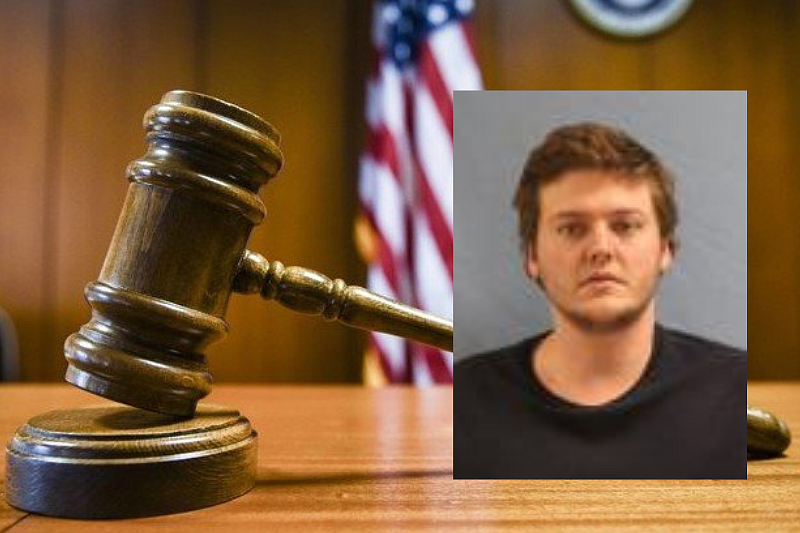The son of a former Arkansas lieutenant governor and grandson of a former governor was sentenced Friday in federal court to 52 months in prison on one count of transfer of a machine gun.
Louis Henry Rockefeller, 25, son of the late Lt. Gov. Win Paul Rockefeller and grandson of the late Gov. Winthrop Rockefeller, pleaded guilty to the charge before U.S. District Judge Lee Rudofsky last November. The previous December, Rockefeller was indicted by a federal grand jury on seven counts of transfer of a machine gun.
In addition to the four years and four months he will spend in prison, Rockefeller was also ordered to serve three years on supervised release and to pay a $100,000 fine.
During the four-hour hearing Friday, Assistant U.S. Attorney Michael Gordon laid out the government's case for a 57-month sentence, the maximum under sentencing guidelines, while Blake Hendrix, Rockefeller's defense attorney, argued for downward variance of 24 months imprisonment, which was 22 months below the minimum guideline sentence of 46 months.
Present in the courtroom, in addition to Rockefeller and his legal team, the prosecution team and observers in the gallery, were four assault rifles, three pistols and a number of 3D printed drop-in auto sears and what are known as "Glock switches," which convert AR-style rifles and Glock semi-automatic pistols to fire a full magazine with one trigger pull. Referencing the armament stacked on the prosecution table and the arguments he expected from Gordon, Hendrix said, "It will be dramatic."
In asking for a lighter sentence, Hendrix argued that Rockefeller would benefit more from a relatively short stay in prison coupled with an extended term of supervised release where he can get rigorous, individualized substance-abuse therapy not typically available in a prison setting. He said a diagnosis of post-traumatic stress disorder related to the death of his father in 2006 and a diagnosis of attention deficit hyperactivity disorder combined with Rockefeller's drug use led to poor impulse control, an argument Rudofsky turned aside.
Most offenders he sees in court, the judge said, have long histories of drug addiction and come from far less supportive backgrounds than Rockefeller.
"I routinely sentence those folks to five years, seven years, nine years, 10 years, and the fact they had drug addictions that maybe contributed in some way ... doesn't tend to change the outcome," he said. "Why should it be any different for Mr. Rockefeller?"
In presenting his case for a high guideline sentence, Gordon questioned North Little Rock homicide detective Michael Gibbons, a task force officer with the Bureau of Alcohol, Tobacco, Firearms and Explosives. Gibbons helped run the investigation into the firearms activities of Rockefeller and his co-defendant, Noah Michael Millea. Gibbons testified to several sales of machine guns and auto-sears between Rockefeller and undercover officers, as well as a cooperating witness who came to police attention after he was arrested with a converted Glock pistol during a drug interdiction operation.
During a recording of one transaction played in court, Rockefeller could be heard telling the confidential informant how to install a drop-in sear into an AR style rifle and offering him a discount if he would bring him more customers.
Gibbons said during his testimony that in the past year, police have been seeing an increasing number of guns on the street converted to automatic fire, which he said local gang members refer to as "spray guns," for which they have a strong preference.
"Unfortunately, they've become the new norm," Gibbons said. "When you shoot someone, you have to aim, but when you're spraying bullets around to send a message you just pull that trigger once to send that message."
A number of recent homicides, he said, have involved spray guns to the point "it's replacing the normal point-and-shoot gun."
Regarding the drop-in sears to convert the guns, Gibbons said the technology exists to mass-produce them cheaply and easily. He said that with a $150 3D printer and $5 worth of filament, "you can pop one of these out every five minutes."
If the danger is so great, Rudofsky asked Gibbons from the bench, why did the investigation -- which lasted several months -- take so long while Rockefeller was left unaware and continuing to distribute both the devices and the converted weapons?
"I'm trying to reconcile how dangerous this conduct is with how long this investigation took and how long you let him stay in business," the judge said.
Gibbons explained that, because Rockefeller was working at the time for a federally licensed firearms dealer, it took time to sort out which activities were illegal and who all was involved. He said the investigation concluded that Rockefeller's employer was not involved in the illegal activities but was apparently used as a front by Rockefeller.
Gordon, in asking for a 57-month sentence, said the thing to remember is how dangerous the firearms Rockefeller was dealing with are.
"These are the norm and that is horrifying," he said. "As we speak we are under a state of emergency declared by the mayor of this city."
Rudofsky said what shocked him was Gordon didn't ask for an upward variance in sentencing.
"If you think this is so bad why only 57 months?" he asked.
Gordon replied that all of the sentencing factors used by the federal government pointed to a guideline sentence instead of the statutory maximum of 10 years.
"This is all baked into the guidelines," he said. Even so, he said, a high-end sentence was called for to send a message to others.
"With this whole city watching," he said, "it's important for these kids to know if you get caught with a Glock switch, you're going to do serious federal time."
Millea pleaded guilty in January to one count of transfer of a machine gun and is awaiting sentencing.
